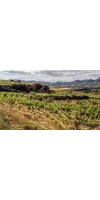Wine from Creaciones Exeo

At Exeo we want drinking one of our wines to transport you to the place where they come from, their landscapes, their people and, above all, their vineyards. That is why we put all our efforts into preserving the quality of our raw material, the vineyard, and its fruit as much as possible.
At Exeo we harvest all our plots by hand and collect the fruit in small boxes, respecting the integrity of the grapes so that they are able to transmit their character to the wine, to the glass.
It is a family winery, located in the urban center of Labastida, an initiative of Fidel Fernández Gibaja, who is followed by his sons Carlos, Fidel and his grandson Guillermo. The winery is part of the heritage of a dynasty of winegrowers with 24 hectares of its own vineyards, some of which are over a hundred years old.
The brothers put all their passion and knowledge into making wines, without forgetting the roots of Rioja Alavesa.
The vineyard is worked logically, respecting as much as possible the structures of the soils of its region and the identity that each grape variety acquires in each plot. They fight for clean cultivation without pesticides, seeking the greatest openness, intensity and purity of Rioja Alavesa, to which they add their constant interest in reinventing themselves. All of this results in the production of world-renowned wines, trying to convey their vineyards, their soils and their house in each bottle of wine they produce.
All of its vineyards are located in Labastida, Rioja Alavesa, sheltered by the Sierra Toloño. These have belonged to them for three generations and another part have been acquired under their criteria and always valuing their soils and orientations.
Respect for maintaining and recovering the small, large payments of Rioja Alavesa. Respect for maintaining the wines that this land offers us, so we work in concrete, both in tanks and in eggs.
No products found
- back
Selected Options
Wineries
Categories
Pricing
Countries
Regions
Grape Types
Wineries
Organic/Free Shipping
Belle Glos Clark and Telephone Vineyard Pinot Noir is made from 100 percent Pinot Noir.
The Clark & Telephone Vineyard was established in 1972 and planted with “own root” Martini clone vines. Located just 13 miles from the ocean and situated on a west-facing slope, this vineyard experiences weather patterns that pull from west to east to bring cool fog and coastal breezes inland until August when Santa Ana winds begin.
We harvested early in the morning so the fruit would arrive at the winery while the grapes were still cool to preserve their vineyard-fresh flavors. After destemming (but not crushing) the berries, we cold-soaked the must for 14 days to soften the skins and allow for ideal extraction. During fermentation in a combination of closed and open-top stainless steel fermenters, we used both punch-down and pump-over techniques to extract color and phenolics. We aged the wine in 100% French oak (60% new) for up to 12 months. After the wine underwent malolactic fermentation, we racked it twice before bottling.
Deep ruby red in color with lush aromas of ripe cherry, nutmeg, dark chocolate and holiday baking spices. Bold and complex flavors of black plum, crushed raspberry and blueberry pie linger on the palate. The texture is rich and lively, and leads into a warm and structured finish.
Review:
Burnished black raspberry and graphite form a bond on a foundation of dark chocolate and sweet tobacco. White pepper outlines rose petal on the well-structured palate before perky acidity and a creamy weightiness highlight the lengthy finish.
-Tasting Panel 95 Points
Manoir du Carra Beaujolais Cru Fleurie Vers le Mont is made from 100 percent Gamay.
Intense red color, subtle fruity and floral aromas of violet, berry and cinnamon. It also has a distinctive aroma of Peony and Lily flowers, typical of the "Sur le Mont" terroir. Ample in the mouth with plenty of ripe red and black fruit flavors. The structure is full and the tannins are round and elegant. Even better after a few years of cellaring.
Of the top ten Cru sites of Beaujolais, Fleurie is one of the top three. The wines show finesse, fullness, and flavor. Fleurie does age well for 3-5 years from vintage. The area was named for a Romain General named Floricum, not for the word flower in French. The size of this AOC is 875 hectares of grapes (2,161 acres) and about 180 examples of this Cru are available on the market. This Cru is known as the “Queen of Beaujolais” and the earth is slightly unusual for having blue color, due to magnesium in the soil.
Intense red color, subtle fruity and floral aromas of violet, berry and cinnamon. It also has a distinctive aroma of Peony and Lily flowers, typical of the "Sur le Mont" terroir.
It is ample in the mouth and has a lot of ripe red and black fruit flavors. The structure is full and the tannins are round and elegant.
Even better after a few years of cellaring.
Excellent with red and game meats, and cheeses.




